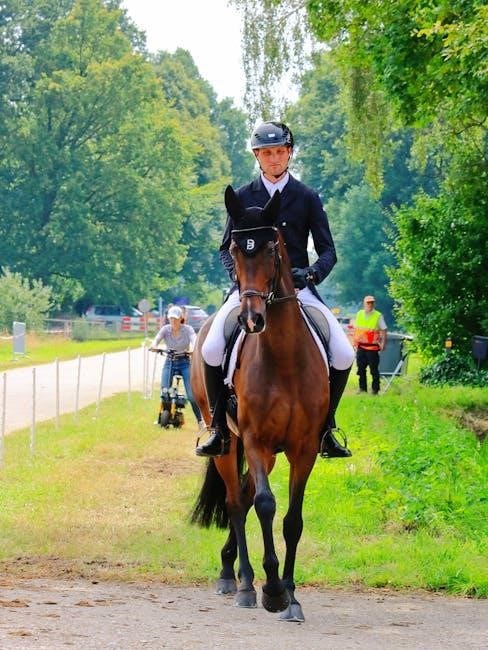discipline equals freedom filetype:pdf
The concept of “discipline equals freedom” explores the paradox where self-control and structure lead to liberation․ By embracing discipline, individuals gain the power to overcome limitations and achieve true freedom․
1․1 Defining Discipline and Freedom
Discipline is the practice of self-control and adherence to structured habits, enabling individuals to regulate their actions and thoughts․ Freedom, in this context, refers to the ability to act without external constraints․ Together, they form a symbiotic relationship: discipline provides the framework for achieving freedom by overcoming internal and external limitations, allowing individuals to pursue their goals with clarity and purpose․ This duality underscores how structure and liberty are not opposites but mutually reinforcing principles․
1․2 The Paradox of Discipline and Freedom
Discipline and freedom may seem contradictory, but they are deeply connected․ Through self-control and structure, individuals can overcome internal limitations and achieve true freedom․ This paradox highlights that discipline is not restrictive but liberating, enabling people to act intentionally and live without being controlled by negative habits or external forces․

The Philosophy Behind Discipline Equals Freedom
Discipline and freedom form a foundational philosophy where structure and self-control empower individuals to break free from limitations, enabling true liberation and self-determination through intentional actions․
2․1 Jocko Willink’s Perspective on Discipline
Jocko Willink, a former Navy SEAL, champions the idea that discipline is the pathway to freedom․ He emphasizes that by mastering self-control over thoughts, emotions, and actions, individuals can liberate themselves from internal and external constraints․ Willink advocates for adopting disciplined routines, strategies to overcome procrastination, and physical training to build resilience․ His philosophy underscores that true freedom emerges when one imposes structure and self-governance, leading to mental toughness and clarity․
2․2 The Role of Self-Control in Achieving Freedom
Self-control is the cornerstone of achieving freedom, as it enables individuals to govern their thoughts, emotions, and actions․ By exercising self-control, one can overcome procrastination, indecision, and negative habits, leading to mental clarity and focus․ This discipline fosters resilience, allowing individuals to stay aligned with their goals and values, ultimately unlocking the freedom to live purposefully and make intentional decisions that shape their lives․

Practical Applications of Discipline in Daily Life
Discipline transforms daily life through consistent routines and habits, empowering individuals to overcome procrastination and indecision, leading to a life of purpose and freedom․
3․1 Building Discipline Through Routine and Habit
Discipline is cultivated through consistent routines and habits, which foster self-control and accountability․ By establishing structured daily practices, individuals develop the mental and physical strength to overcome procrastination and indecision․ Starting with small, manageable tasks and gradually increasing complexity helps build resilience․ Tracking progress and maintaining consistency reinforce these habits, leading to a life of purpose and freedom from the constraints of disorganization and laziness․
3․2 Overcoming Procrastination and Indecision
Procrastination and indecision often stem from fear and lack of clarity․ Discipline helps break tasks into manageable steps, eliminating overwhelm․ Techniques like the “2-Minute Rule” and immediate action counteract delay․ By committing to decisions and learning from outcomes, confidence grows, replacing paralysis with purposeful progress․ Overcoming these barriers frees individuals from mental constraints, fostering a disciplined mindset that drives consistent action and achievement․

The Psychological Impact of Discipline
Discipline cultivates mental resilience and self-control, empowering individuals to overcome negative thoughts and emotions․ It fosters a stable mindset, reducing anxiety and enhancing clarity in decision-making processes․
4․1 How Discipline Shapes Mental Toughness
Discipline is the cornerstone of mental toughness, enabling individuals to withstand challenges and stay focused․ Through consistent practice, discipline builds resilience, allowing people to navigate adversity with confidence and clarity․ It teaches the mind to remain steadfast, even in the face of overwhelming obstacles․ This mental fortitude translates into everyday life, helping individuals maintain composure and achieve their goals․ Mental toughness, born from discipline, becomes a powerful tool for success․
4․2 The Connection Between Discipline and Mental Freedom
Discipline fosters mental freedom by liberating the mind from chaotic thoughts and emotions․ Through self-control, individuals gain clarity and focus, reducing stress and anxiety․ By adhering to structured habits, one breaks free from negative patterns, achieving a sense of inner peace and confidence․ This mental liberation allows for better decision-making and a clearer sense of purpose, ultimately leading to a more fulfilling and free life․
The Role of Physical Discipline in Achieving Freedom
Physical discipline creates freedom by establishing structure and self-control; Consistent training builds resilience, enabling individuals to transcend physical and mental barriers, achieving true liberation․
5․1 The Importance of Physical Training
Physical training is a cornerstone of discipline, fostering resilience and mental clarity․ Regular exercise builds self-control, enabling individuals to overcome physical limitations and achieve freedom․ Through consistent effort, one gains mastery over their body, which translates into greater discipline and autonomy in all aspects of life․
5․2 Discipline as a Means to Overcome Physical Limitations
Discipline is a powerful tool for surpassing physical boundaries․ Through structured routines and relentless effort, individuals can push past perceived limits, achieving strength and endurance․ This process cultivates mental resilience, enabling one to embrace challenges and attain freedom from physical constraints, ultimately transforming the body into an instrument of empowerment and self-mastery․
Discipline and Creativity
Discipline and creativity are interconnected, as structured routines and focused efforts provide the foundation for innovative thinking and artistic expression, leading to greater creative freedom․
6․1 How Discipline Fosters Creativity
Discipline provides the structure and routine necessary for creativity to flourish․ By establishing clear boundaries and focused habits, individuals create a stable environment where ideas can emerge․ Mental clarity and reduced distractions allow for deeper concentration, enabling innovative thinking․ Discipline also builds resilience, helping creators persevere through challenges․ This balance of structure and freedom nurtures creativity, leading to more effective and impactful artistic and intellectual expression․
6․2 Balancing Structure and Freedom in Creative Processes
Balancing structure and freedom is essential for creativity․ Discipline provides the framework, while freedom allows exploration․ Structured routines and clear goals channel creative energy, preventing aimlessness․ Freedom within these boundaries fosters innovation․ This harmony enables artists and thinkers to explore new ideas confidently, knowing their foundation is solid․ The interplay between constraint and liberation sparks originality, leading to meaningful and impactful creative outcomes․
The Societal Impact of Discipline Equals Freedom
Discipline fosters accountability, unity, and progress in communities․ Structured societies thrive through mutual respect and adherence to principles, creating environments where collective goals are achieved efficiently․
7․1 Discipline in Leadership and Teamwork
Discipline is the cornerstone of effective leadership and teamwork․ Leaders who embody self-control inspire their teams to maintain focus and accountability․ When individuals within a team adhere to structured processes, collaboration becomes seamless, fostering an environment of trust and productivity․ This collective discipline ensures that goals are met efficiently and challenges are overcome with unity․ It creates a culture where every member contributes meaningfully to shared success․
7․2 How Discipline Influences Community and Society
Discipline fosters a stable and orderly society by promoting accountability and respect among individuals․ When communities embrace self-control, they create an environment of mutual trust and cooperation․ This collective discipline leads to improved public services, safer neighborhoods, and stronger social bonds․ Societal progress is accelerated as disciplined individuals contribute positively, ensuring that freedom is not just personal but also communal, benefiting everyone and laying the foundation for a harmonious and prosperous society․
Real-Life Success Stories
Individuals like Jocko Willink exemplify how discipline equals freedom․ Their journeys highlight overcoming challenges through self-control, achieving personal and professional success, and inspiring others to embrace discipline․
8․1 Examples of Individuals Who Embody Discipline Equals Freedom
Notable figures like Jocko Willink, a former Navy SEAL, personify the principle of discipline equals freedom․ His journey from military service to authorship showcases how rigid self-control and adherence to discipline have enabled him to achieve personal and professional liberation․ Similarly, athletes and entrepreneurs who prioritize structure and self-discipline often attain remarkable success, demonstrating the transformative power of this philosophy in real-life scenarios and inspiring others to adopt similar practices for their own freedom and growth․ Their stories serve as living proofs of how discipline can unlock true potential and lead to extraordinary accomplishments, making them role models for those seeking to embrace this mindset and reap its benefits in various aspects of life․
8․2 Lessons Learned from Their Journeys
Individuals who embody “discipline equals freedom” teach that true liberation arises from self-control and perseverance․ Their journeys reveal that consistent effort and structured habits are essential for overcoming obstacles․ They emphasize that freedom is not the absence of constraints but the ability to act purposefully․ These lessons highlight the importance of mental and physical discipline in achieving long-term goals and living a fulfilling life, inspiring others to adopt similar principles for their own success and personal growth․

The Long-Term Benefits of Embracing Discipline
Embracing discipline leads to lasting freedom, as it fosters habits that promote goal achievement, mental clarity, and a purposeful life․
9․1 Freedom from Negative Habits and Thoughts
Discipline empowers individuals to break free from negative habits and thought patterns․ By cultivating self-control, one gains mental clarity and the ability to overcome procrastination, fear, and indecision․ This liberation fosters a mindset focused on purpose and productivity, enabling long-term personal growth and freedom from self-imposed limitations․
9․2 Achieving Long-Term Goals Through Discipline
Discipline is the cornerstone of achieving long-term goals․ By aligning daily actions with a clear vision, individuals cultivate persistence and focus․ This consistent effort builds mental toughness, enabling the overcoming of obstacles․ Through self-control and accountability, discipline ensures steady progress, ultimately leading to the realization of aspirations and sustained success over time․
Discipline equals freedom is a transformative concept, teaching that structure and self-control are pathways to liberation․ Embracing discipline unlocks potential, fostering mental toughness and long-term success․
10․1 Recap of Key Points
Discipline equals freedom emphasizes that structure and self-control are essential for liberation․ By adhering to routines, overcoming procrastination, and building mental toughness, individuals can achieve freedom from negative habits and limitations․ This concept, championed by figures like Jocko Willink, highlights the importance of discipline in unlocking personal potential and fostering long-term success․
10․2 Final Thoughts on Discipline Equals Freedom
Discipline equals freedom is a transformative concept that empowers individuals to break free from constraints and achieve their full potential․ By cultivating self-control, embracing structure, and overcoming limitations, one can attain true liberation․ This philosophy, rooted in personal responsibility, encourages individuals to take charge of their lives, leading to lasting freedom and fulfillment․ Embrace discipline as a pathway to unlock your true self and realize your aspirations․
